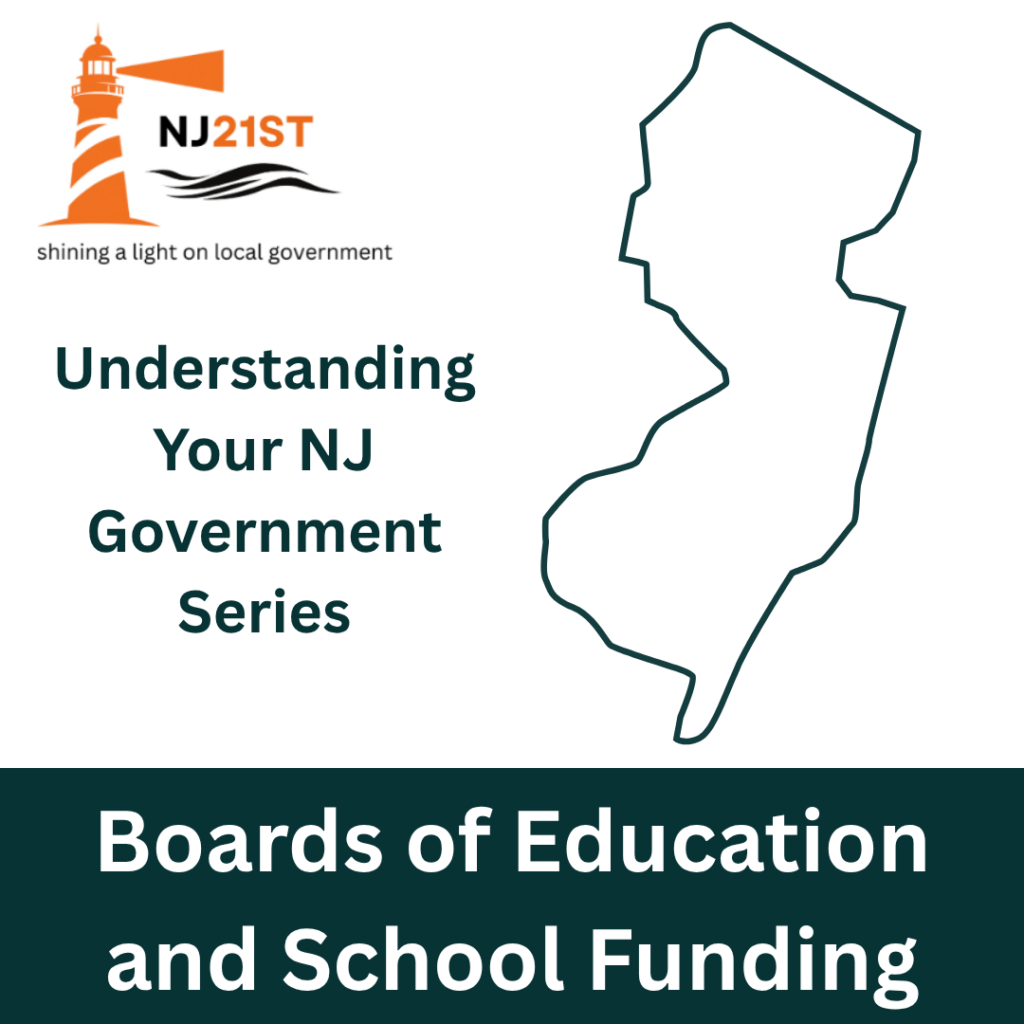The fourth article in an ongoing series intended to help NJ residents, especially students, understand their local and state government.
Overview
New Jersey’s public school system is one of the oldest in the country and Boards of Education (BOE) were created to keep schools accountable to their communities,
New Jersey’s public school districts fall into two categories:
Type I Districts
These are in the minority and are usually found in cities (examples: Newark, Jersey City). In Type I districts, Board of Education members are appointed by the Mayor, with the Board of School Estimate responsible for approving the budget and any bond issues.
Type II Districts
In Type II districts, Board of Education members are elected directly by voters and are also responsible for approving the budget as long as it remains within the state’s spending cap. Since 2012 most districts moved their elections to November.
Roles
The Board of Education approves policy, sets district goals, adopts curriculum, approves contracts and oversees the budget and spending- it does not manage day to day operations. Boards act as a collective through votes taken at public meetings.
The Superintendent is the District’s top administrator – they are responsible for implementing board policies, managing staff, and oversees the day to day.
The Business Administrator (who usually also serves as Board Secretary) is responsible for the district’s fiscal management, purchasing, payroll, and financial compliance.
Meetings, Transparency, and Public Access
The Open Public Meetings Act and Open Public Records Act are critical to the public’s responsibility to inform Boards of Education and hold districts accountable. These laws ensure that the public can attend meetings, that decisions are made in view of the public, ensures public access to agendas and minutes and allows residents to request government records.
BOE meeting schedules must be posted in advance and include time for public comment. Executive sessions, which are not open to the public, are an exception and can only occur for specific reasons such as personnel matters, negotiations, or legal issues.
Residents have a right to speak during public comment periods and are allowed to record meetings. These rights have been repeatedly reaffirmed by court decisions.
Elections
In 2012, a major change in state law allowed districts to move their school elections from April to November. Any district that made this change no longer had to submit its annual operating budget to voters, as long as the budget stayed within the state’s 2 percent property tax levy cap.
As a result, the majority of Board of Education elections now take place in November, which means that in most districts, residents no longer have a direct say each year on how much is spent – only on who serves on the board and on capital referendums.
Some smaller districts still hold April elections.
Board members usually serve three-year terms, with elections staggered so that roughly one-third of the board is on the ballot each year.
Budgets and Referendums
School budgets make up the largest share of local property taxes in most New Jersey towns. The budget process begins with the adoption of a preliminary budget by the Board of Education, which is submitted to the Department of Education (NJDOE) for review, with final approval granted at a public meeting.
As stated above, only those districts that still hold April elections are required to place their budgets before voters each year. The rest are approved by the board itself without a public vote.
Districts that exceed the 2 percent levy cap or seek to issue new bonds must still hold a referendum, regardless of when they hold their elections.
Bonded projects are governed by state law, with oversight from both the NJDOE’s Office of School Facilities and the Local Finance Board.
How Schools are Funded
NJ schools get dollars through a combination of property taxes, state and federal aid. State aid comes from a formula that has it’s basis in the School Funding Reform Act intended to help Districts with less wealth provide an adequate education. Remember, property taxes are a big part of what funds local Districts and if the tax base is not there, schools in those communities suffer.
The fair share formula revolves around two factors –
Local Fair Share: What the state expects a community to contribute to it’s schools
Adequacy Budget: What the state believes an constitutionally compliant education should cost
That combines two variables:
Property Wealth – how much the taxable property in the is District worth
Income Wealth – how much residents in a District earn
As a result, the wealthier a community is the less aid it receives.
Formula –
Local Fair Share = (0.0144 × Equalized Property Value) + (0.047 × Aggregate Income)
This is the state’s approach to ensuring that every kid has access to an adequate education regardless of where they live while still holding local communities accountable to what the state thinks it can afford.
Quick Summary: Understanding New Jersey’s Boards of Education
- Local Accountability: Boards of Education (BOE) keep schools accountable to their communities under New Jersey’s “thorough and efficient” education mandate.
- Two Types of Districts:
- Type I: Board members are appointed by the Mayor and budgets are approved by a Board of School Estimate (for example Newark or Jersey City).
- Type II: Elected boards approve budgets within the 2 percent cap. Most districts moved elections to November in 2012.
- Key Roles: The Board sets policy, the Superintendent manages daily operations, and the Business Administrator oversees finances and compliance.
- Transparency: The Open Public Meetings Act (OPMA) and the Open Public Records Act (OPRA) guarantee public access to meetings, agendas, and records. Residents can attend, comment, and record meetings.
- Elections: Most districts hold BOE elections in November. Budgets under the 2 percent cap no longer go to voters, while capital referendums still require voter approval.
- Budgets and Referendums: School budgets make up the largest portion of local property taxes. Major spending or bond projects require voter-approved referendums reviewed by the NJ Department of Education.
- How Funding Works: Each town has a “local fair share,” which is the amount the state believes it can reasonably afford to contribute to education. This figure is based on property values and resident income. Towns with higher property and income wealth are expected to cover more of their own school costs and therefore receive less state aid, while communities with lower wealth receive more help from the state.
Check Wiki for Full Series (developing)
|



